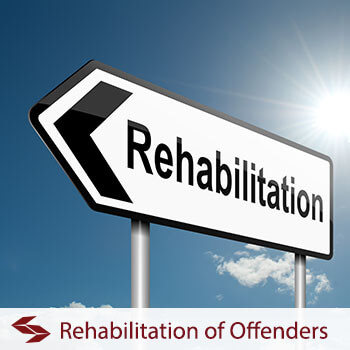 The Rehabilitation of Offenders Act 1974 provides a framework for people with convictions to have those convictions considered spent after a defined period following the conviction. The purpose of the Act is to allow people to effectively put those convictions behind them and not have to carry the burden of disclosure or the possibility of the conviction influencing others in the future. The framework provides differing time periods based upon the severity of the conviction. it is worth noting that whilst the periods of rehabilitation have been reduced for many offences, driving licencee endorsements are only spent after 5 years and must be declared even when the points associated with that endorsement have expired.
The Rehabilitation of Offenders Act 1974 provides a framework for people with convictions to have those convictions considered spent after a defined period following the conviction. The purpose of the Act is to allow people to effectively put those convictions behind them and not have to carry the burden of disclosure or the possibility of the conviction influencing others in the future. The framework provides differing time periods based upon the severity of the conviction. it is worth noting that whilst the periods of rehabilitation have been reduced for many offences, driving licencee endorsements are only spent after 5 years and must be declared even when the points associated with that endorsement have expired.
What is a spent conviction?
Once the period has passed, the slate is wiped clean and not only can the person who was convicted not disclose the offence anyone acting upon information regarding a spent conviction can face prosecution.
When does a conviction become spent?
The table shows a brief overview of the conviction types and the period of rehabilitation for each one. This table represents the current position.
| Sentence | Over 18 At Conviction | Under 18 At Conviction |
| Prison/YOI: More than 4 Years | Forever | Forever |
| Prison/YOI: More than 30 months up to 4 Years | Sentence plus 7 Years | Sentence plus 3.5 Years |
| Prison/YOI: More than 6 months up to 30 months | Sentence plus 4 Years | Sentence plus 2 Years |
| Prison/YOI: 6 months or less | Sentence plus 2 Years | Sentence plus 18 Months |
| Community Order / Probation | 1 Year | 6 Months |
| Fine | 1 Year | 6 Months |
| Absolute Discharge | Spent Immediately | Spent Immediately |
| Conditional caution | When conditions end | When conditions end |
| Simple caution, reprimands and final warnings | Immediately | Immediately |
What convictions do I need to disclose to an insurance company?
The law relating to the duty of disclosure for personal insurance contracts changed in April 2013 and now you have to be specifically asked about convictions, for other insurance contracts you still have a duty to disclose any “material facts” whether or not specifically requested by the insurance company, although in practice you will generally be asked.
You need to disclose any conviction that is not spent under the Rehabilitation of Offenders Act 1974. Failure to do so can invalidate your insurance policy.
Do I need to disclose a motoring conviction that is spent but the points are still on my licence?
Certain endorsements for motoring offences remain on the driver’s licence for a period of 11 years. Under the Act you do not need to disclose these offences, providing there was no custodial sentence in accordance with the table above, after 5 years as they are spent under the Act.
What do insurers do with information regarding convictions?
Insurers consider information regarding convictions as very important in understanding the risk with which they are presented. Details regarding previous convictions can raise issues over the driving habits of the proposer and also raise issues of potential moral hazards with the prospective client. Sometimes the convictions are considered as not relavant and ignored, on other occasions they may have a severe impact on whether an insuerr will accept a risk and if so the terms they require.
